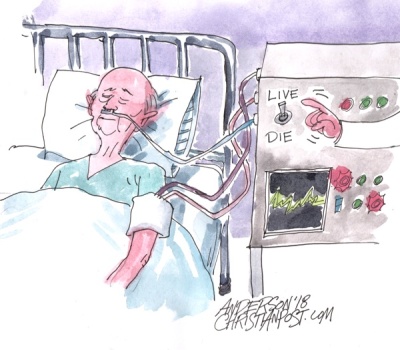A welcome defeat of assisted suicide in Virginia

The Virginia Senate Education and Health Committee considered legislation legalizing assisted suicide, SB 688, earlier in February. Thankfully, with a vote of 7-7-1, this legislation failed. Modeled after similar bills across the country, SB 688 would have allowed a patient with a six-month terminal diagnosis to request and ingest medication for the explicit purpose of ending their own life.
Oregon was the first state to legalize assisted suicide in 1997. Since that time, nine other states and the District of Columba have also legalized it. Although proponents of assisted suicide argue it “empowers” everyone to dictate their end of life, this misguided desire for complete control has the unintended consequence of creating a culture in which certain lives are deemed unworthy of living.
According to the Oregon Health Authority, which has compiled over 20 years of data on assisted suicide, excruciating pain is not the reason most people choose assisted suicide. The top five reasons for choosing assisted suicide are the inability to engage in activities that make life enjoyable; the loss of autonomy; the loss of dignity; the feeling of being a burden on family, friends, or caregivers; and loss of control of bodily functions. These struggles are incredibly challenging, but they by no means devalue a person’s life. People facing struggles such as these need true compassion based on the willingness to share their suffering.
People with disabilities are some of assisted suicide’s strongest opponents. They recognize that every person has dignity and that many of the reasons deemed valid for ending a life are challenges people with disabilities overcome every day. Certainly, not everyone who lives with a disability has a terminal illness, but at some point, everyone who has a terminal illness will experience some form of disability. People aren’t choosing to end their lives because of their terminal illness but because of the disabilities caused by their terminal illness. Legalizing assisted suicide sends the message that a life with disabilities is not a life worth living.
In a profit-driven health care system, the odds are already stacked against people with disabilities. So states need to pass legislation protecting people with disabilities from discrimination — not legislation that allows insurance companies to choose to cover the cheapest option, lethal drugs, instead of actual care.
People with disabilities are not the only ones negatively impacted by this discriminatory practice. All people — especially minorities — who have disparate access to health care feel its effects. As Anita Cameron, minority outreach director for Not Dead Yet, said, “As long as racial disparities and disability discrimination exist in health care, assisted suicide cannot be the answer.” Sadly, in both Oregon and California, patients who would not have been terminal had they received medical care have been refused treatment and instead offered assisted suicide drugs.
Moreover, the option of assisted suicide prevents people with terminal illnesses from getting the mental health support they desperately need. Medical literature suggests that 25 to 77% of patients with terminal illnesses suffer from major depression. Yet, since its legalization in 1998, only 4% of patients who died through assisted suicide were referred for psychiatric evaluation. Tragically, instead of receiving the help they need, patients are offered the option to kill themselves. The assisted suicide legislation does not require family notification or the presence of a witness at the time of death. And so, those struggling with the desire to end their lives by taking the lethal drugs may simply suffer in silence until their death, with heartbroken loved ones left wondering if they could have done more.
The legalization of assisted suicide attempts to normalize and affirm the suicide of patients with terminal illnesses; however, it has the unintended consequence of normalizing and affirming suicide itself. For those suffering from suicide ideation, this has tragic consequences. The Centers for Disease Control reported a 49% increase in the suicide rate in Oregon from 1999-2010, as opposed to a 28% increase nationally.
The assisted suicide legislation proposed in Virginia disregards the value of human life and opens the door for exploitation and coercion. Pray that assisted suicide legislation would fail and for a renewed respect for the dignity of the human person — not only in Virginia but in all 50 states.
If you or someone you know is in crisis, call the National Suicide Prevention Lifeline at 1-800-273-8255.
Originally published at the Family Research Council.
Mary Szoch serves as the Director of the Center for Human Dignity at Family Research Council. In this position, Mary researches, writes, and coordinates collaborative efforts with other pro-life advocates on policies surrounding life and human dignity.



























